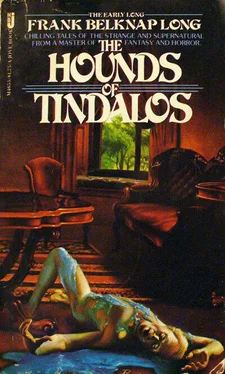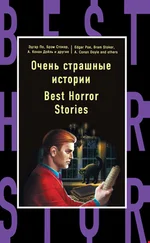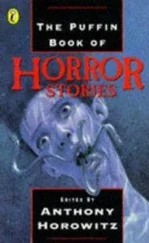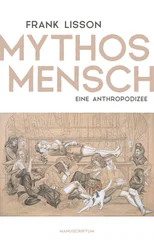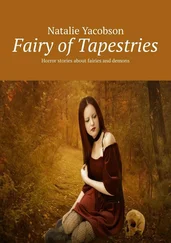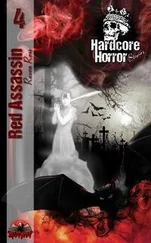The droning did not commence until we had left the wood. At first we scarcely heard it, it was so low, like the purring of gigantic engines far down in the earth. But slowly, as we stumbled forward with our burden, it grew so loud that we could not ignore it.
"What is that?" muttered Howard, and through the wraiths of fog I saw that his face had a greenish tinge.
"I don't know," I mumbled. "It's something horrible. I never heard anything like it. Can't you walk faster?"
So far we had been fighting familiar horrors, but the droning and humming that rose behind us was like nothing that I had ever heard on Earth. In excruciating fright, I shrieked aloud. "Faster, Howard, faster! For God's sake, let's get out of this!"
As I spoke, the body that we were carrying squirmed, and from its cracked lips issued a torrent of gibberish: "I was walking between the trees looking up. I couldn't see their tops. I was looking up, and then suddenly I looked down and the thing landed on my shoulders. It was all legs — all long, crawling legs. It went right into my head. I wanted to get away from the trees, but I couldn't. I was alone in the forest with the thing on my back, in my head, and when I tried to run, the trees reached out and tripped me. It made a hole so it could get in. It's my brain it wants. Today it made a hole, and now it's crawled in and it's sucking and sucking and sucking. It's as cold as ice and it makes a noise like a great big fly. But it isn't a fly. And it isn't a hand. I was wrong when I called it a hand. You can't see it. I wouldn't have seen or felt it if it hadn't made a hole and got in. You almost see it, you almost feel it, and that means that it's getting ready to go in."
"Can you walk, Wells? Can you walk?"
Howard had dropped Wells's legs, and I could hear the harsh intake of his breath as he struggled to rid himself of his slicker.
"I think so," Wells sobbed. "But it doesn't matter. It's got me now. Put me down and save yourselves."
"We've got to run!" I yelled.
"It's our one chance," cried Howard. "Wells, you follow us. Follow us, do you understand? They'll burn up your brain if they catch you. We're going to run, lad. Follow us!"
He was off through the fog. Wells shook himself free, and followed like a man in a trance. I felt a horror more terrible than death. The noise was dreadfully loud; it was right in my ears, and yet for a moment I couldn't move. The wall of fog was growing thicker.
"Frank will be lost!" It was the voice of Wells, raised in a despairing shout.
"We'll go back!" It was Howard shouting now. "It's death, or worse, but we can't leave him."
"Keep on," I called out. "They won't get me. Save yourselves!"
In my anxiety to prevent them from sacrificing themselves I plunged wildly forward. In a moment I had joined Howard and was clutching at his arm.
"What is it?" I cried. "What have we to fear?"
The droning was all about us now, but no louder.
"Come quickly or we'll be lost!" he urged frantically. "They've broken down all barriers. That buzzing is a warning. We're sensitives— we've been warned, but if it gets louder we're lost. They're strong near Mulligan Wood, and it's here they've made themselves felt. They're experimenting now — feeling their way. Later, when they've learned, they'll spread out. If we can only reach the farm…"
"We'll reach the farm!" I shouted as I clawed my way through the fog.
"Heaven help us if we don't!" moaned Howard.
He had thrown off his slicker, and his seeping wet shirt clung tragically to his lean body. He moved through the blackness with long, furious strides. Far ahead we heard the shrieks of Henry Wells. Ceaselessly the foghorns moaned; ceaselessly the fog swirled and eddied about us.
And the droning continued. It seemed incredible that we should ever have found a way to the farm in the blackness. But find the farm we did, and into it we stumbled with glad cries.
"Shut the door!" shouted Howard.
I shut the door.
"We are safe here, I think," he said. "They haven't reached the farm yet."
"What has happened to Wells?" I gasped, and then I saw the wet tracks leading into the kitchen. Howard saw them too. His eyes flashed with momentary relief.
"I'm glad he's safe," he muttered. "I feared for him."
Then his face darkened. The kitchen was unlighted and no sound came from it.
Without a word Howard walked across the room and into the darkness beyond. I sank into a chair, flicked the moisture from my eyes, and brushed back my hair, which had fallen in soggy strands across my face. For a moment I sat, breathing heavily, and when the door creaked, I shivered. But I remembered Howard's assurance: "They haven't reached the farm yet. We're safe here."
Somehow, I had confidence in Howard. He realized that we were threatened by a new and unknown horror, and in some occult way he had grasped its limitations.
I confess, though, that when I heard the screams that came from the kitchen, my faith in my friend was slightly shaken. There were low growls, such as I could not believe came from any human throat, and the voice of Howard raised in wild expostulation. "Let go, I say! Are you quite, mad? Man, man, we have saved you! Don't, I say — let go of my leg. Ah-h-h!"
As Howard staggered into the room I sprang forward and caught him in my arms. He was covered with blood from head to foot, and his face was ashen.
"He's gone raving mad," he moaned. "He was running about on his hands and knees like a dog. He sprang at me, and almost killed me. I fought him off, but I'm badly bitten. I hit him in the face — knocked him unconscious. I may have killed him. He's an animal — I had to protect myself."
I laid Howard on the sofa and knelt beside him, but he scorned my aid.
"Don't bother with me!" he commanded. "Get a rope, quickly, and tie him up. If he comes to, we'll have to fight for our lives."
What followed was a nightmare. I remember vaguely that I went into the kitchen with a rope and tied poor Wells to a chair; then I bathed and dressed Howard's wounds, and lit a fire in the grate. I remember also that I telephoned for a doctor. But the incidents are confused in my memory, and I have no clear recollection of anything until the arrival of a tall, grave man with kindly and sympathetic eyes and a presence that was as soothing as an opiate.
He examined Howard, nodded, and explained that the wounds were not serious. He examined Wells, and did not nod. He explained slowly, "His pupils don't respond to light," he said. "An immediate operation will be necessary. I tell you frankly, I don't think we can save him."
"That wound in his head, Doctor," I said. "Was it made by a bullet?"
The doctor frowned. "It puzzles me," he said. "Of course it was made by a bullet, but it should have partially closed up. It goes right into the brain. You say you know nothing about it. I believe you, but I think the authorities should be notified at once. Someone will be wanted for manslaughter, unless" — he paused—"unless the wound was self-inflicted. What you tell me is curious. That he should have been able to walk about for hours seems incredible. The wound has obviously been dressed, too. There is no clotted blood at all."
He paced slowly back and forth. "We must operate here — at once. There is a slight chance. Luckily, I brought some instruments. We must clear this table and — do you think you could hold a lamp for me?"
I nodded. "I'll try," I said.
"Good!"
The doctor busied himself with preparations while I debated whether or not I should phone for the police.
"I'm convinced," I said at last, "that the wound was self-inflicted. Wells acted very strangely. If you are willing, Doctor…"
"Yes?"
"We will remain silent about this matter until after the operation. If Wells lives, there would be no need of involving the poor chap in a police investigation."
Читать дальше
